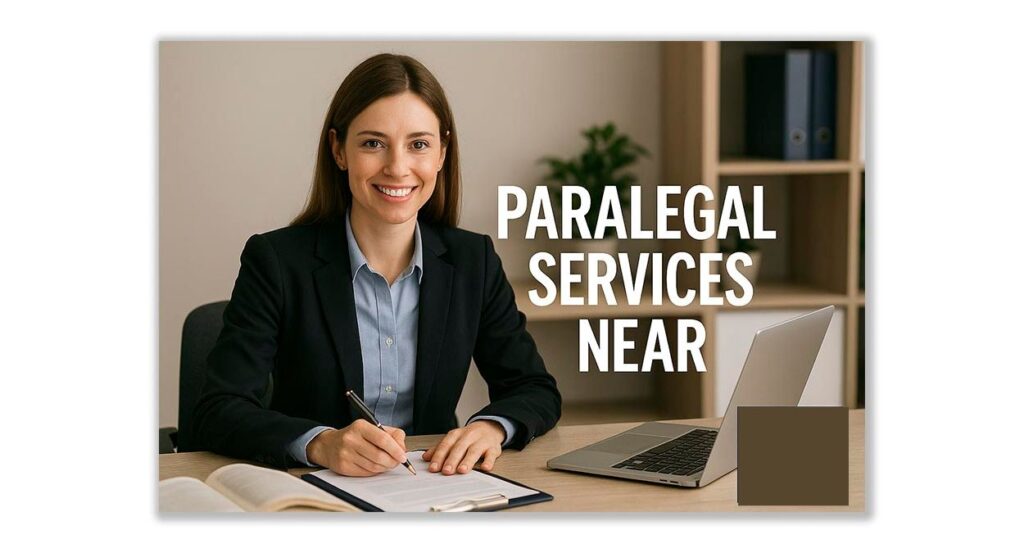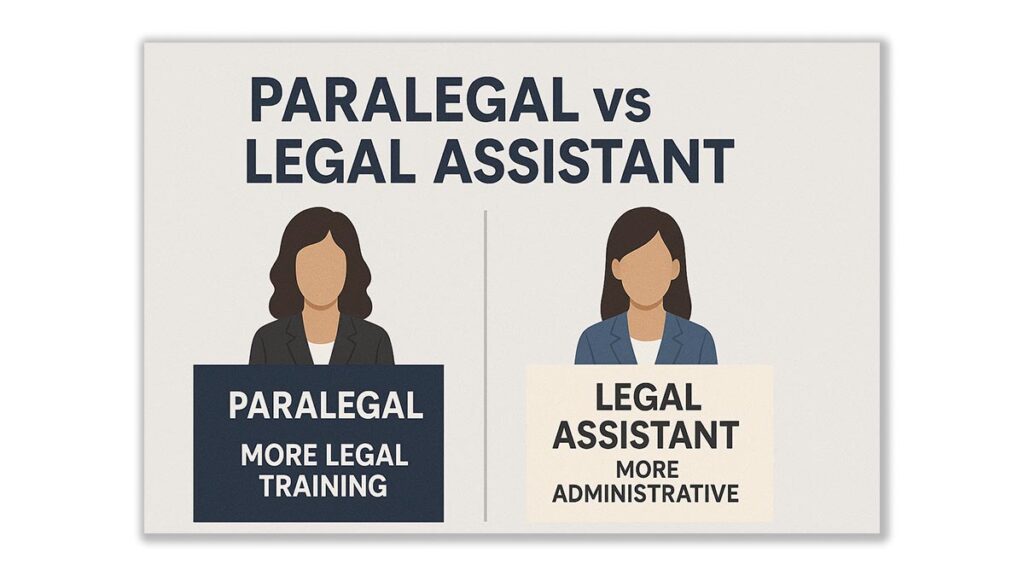The question can a paralegal give legal advice is a critical one for understanding the boundaries of paralegal roles in the legal field. Paralegals play an essential role in supporting attorneys, but their authority to act independently is limited. This article explores what paralegals can and cannot do, with a focus on their responsibilities and ethical boundaries.

What Is the Role of a Paralegal?
A paralegal is a trained legal professional who assists attorneys with various tasks, including legal research, drafting documents, and managing case files. While they play a vital role in law firms, they are not licensed to practice law.
Key Responsibilities:
- Conducting legal research and preparing case summaries.
- Drafting contracts, pleadings, and other legal documents under attorney supervision.
- Managing case files and tracking important deadlines.
- Assisting in trial preparation and client interviews.
Despite their expertise, paralegals must operate under the direction of a licensed attorney.
Can a Paralegal Give Legal Advice?
The short answer is no, paralegals cannot provide legal advice. This limitation is rooted in the laws governing the unauthorized practice of law (UPL). Only licensed attorneys are authorized to:
- Offer legal opinions or advice to clients.
- Represent clients in court or during legal negotiations.
- Establish attorney-client relationships.
Paralegals may provide factual information about legal procedures or assist in explaining legal documents, but they must avoid interpreting laws or offering advice.
Why Can’t Paralegals Give Legal Advice?
Legal and Ethical Boundaries:
- Unauthorized Practice of Law (UPL): Laws vary by jurisdiction, but all prohibit non-attorneys from offering legal advice to protect clients from unqualified guidance.
- Professional Integrity: Maintaining a clear distinction between paralegals and attorneys ensures the integrity of legal services.
Risks of Violating UPL:
- Paralegals who provide legal advice may face legal penalties and jeopardize their careers.
- The supervising attorney and law firm may also face consequences, including fines or disciplinary actions.
How Paralegals Support Legal Advice Delivery
Although they cannot give legal advice, paralegals play a significant role in supporting attorneys who do. Their contributions include:
Case Preparation:
- Researching relevant laws, precedents, and regulations.
- Drafting documents that attorneys review and finalize.
Client Communication:
- Gathering case details and ensuring accurate records.
- Clarifying procedural steps without interpreting laws.
Trial Assistance:
- Organizing exhibits and preparing evidence.
- Ensuring all required documentation is ready for court proceedings.
Looking for skilled paralegals to enhance your legal team? Contact Regents to find professionals tailored to your firm’s needs!
Can a paralegal explain legal documents?
Yes, paralegals can explain the factual content of legal documents but must avoid interpreting or advising on their meaning.
Can paralegals interact directly with clients?
Yes, paralegals often communicate with clients to gather information or provide updates, but they cannot offer advice or opinions.
What happens if a paralegal provides legal advice?
Engaging in UPL can result in serious legal and professional repercussions for both the paralegal and the supervising attorney.
While paralegals are indispensable in legal operations, they cannot give legal advice due to strict ethical and legal boundaries. Their role complements that of attorneys, ensuring efficient and accurate support. Discover next how Regentsrs can connect your firm with top-tier paralegals to strengthen your legal practice.
Can paralegals go to court—and if so, in what capacity? While attorneys hold the exclusive license to advocate, paralegals play an essential supporting role that sometimes places them inside courtrooms, hearing rooms, and administrative tribunals. Understanding the precise limits and opportunities of paralegal courtroom involvement is critical for firm leaders who want to maximize efficiency without risking unauthorized-practice violations. This article dissects federal and state guidelines, practical use cases, and risk-management tactics to help partners deploy paralegals strategically while safeguarding ethical compliance and client interests.

The Strategic Question: Can Paralegals Go to Court?
At its core, the question “can paralegals go to court” turns on representation rights. Across all U.S. jurisdictions, only licensed attorneys may argue motions, examine witnesses, or sign pleadings. Paralegals, however, may:
- Attend court with attorneys to manage exhibits, technology, and real-time research.
- Deliver and file documents with the clerk’s office when properly supervised.
- Appear in limited administrative venues (workers’-comp boards, Social Security hearings) where state rules expressly permit non-lawyer representation—often with written client consent and attorney oversight.
Efficiency Gains Without Overstepping
Permitting paralegals to handle logistics inside the courthouse frees attorneys to focus on oral argument and case strategy. When firms clarify the answer to “can paralegals go to court” in internal policy handbooks, they unlock productivity while preventing inadvertent ethics breaches.
Key Scenarios Where Paralegals May Enter the Courtroom
| Scenario | Permitted Activities | Prohibited Activities | Compliance Tips |
|---|---|---|---|
| Civil trial with lead counsel present | Manage demonstratives, assist with exhibits, coordinate witnesses | Address the judge, question witnesses, make objections | Paralegal wears firm badge, counsel introduces support role on record |
| Routine filing (e.g., motions, discovery) | Physically file papers, obtain stamped copies | Provide legal advice to opposing counsel or pro se parties | Attach attorney-signed cover sheet; maintain filing log |
| Administrative agency hearing (state-specific) | Present documents, summarize facts if allowed | Legal argument unless rules expressly allow | Confirm agency rules; secure client’s written authorization |
Regulatory Landscape Shaping Whether Paralegals Can Go to Court
Most states adopt ABA Model Rule 5.3, requiring attorneys to supervise non-lawyer staff. Violations—letting paralegals argue a motion, for instance—expose both firm and supervising lawyer to sanctions.
Administrative & Agency-Specific Exceptions
Certain forums (e.g., U.S. Patent Office pre-exam interviews, VA benefits appeals) permit certified non-attorney representatives. Firms leveraging these rules must register paralegals, complete agency trainings, and disclose representation status to clients.
Courtroom Technology & E-Filing Roles
Although the answer to “can paralegals go to court” rarely includes speaking at counsel table, many courts welcome paralegal support for digital-evidence display and live-note management—tasks that reduce trial glitches and attorney stress.
Maximizing Courtroom Impact While Staying Compliant
A written checklist clarifies who carries exhibits, who updates the docket, and how paralegals communicate with attorneys during proceedings (e.g., secure messaging). This guards against role confusion under courtroom pressure.
Provide Targeted Training
Workshops on courtroom decorum, e-filing kiosks, and exhibit numbering protocols transform paralegals into indispensable in-court allies without crossing advocacy lines.
Need highly skilled intake specialists for your law firm? Get in touch with us to discuss your firm’s unique needs!
Leverage Technology for Real-Time Collaboration
Shared cloud folders, tablet-based note apps, and live transcription feeds allow paralegals seated behind the bar—or back at the office—to feed attorneys up-to-the-minute research, precedent, or impeachments, enhancing courtroom agility.
Risk Management & Ethical Safeguards
- Advance Court Notification: Some judges require notice if non-lawyer staff will sit at counsel table; early disclosure averts bench admonitions.
- Conflict-Check Extensions: Paralegals attending court may interact with opposing staff; ensure they understand “no advice” boundaries.
- Confidentiality Protocols: Transporting exhibits demands encrypted drives, sealed boxes, or secure courier services.
So, can paralegals go to court? Yes—within carefully defined parameters that emphasize assistance, not advocacy. By drafting clear policies, investing in courtroom-support training, and observing jurisdiction-specific rules, law-firm leaders can harness paralegal talents on the front lines of litigation without risking ethical missteps.
From exhibit prep to live-research support, paralegals elevate courtroom performance when firms deploy them strategically and compliantly. Clarifying “can paralegals go to court” in your operations manual empowers staff, delights clients, and safeguards your professional standing. Looking to refine courtroom staffing or intake processes further? Stay tuned for more insights on how Regentsrs helps firms recruit, train, and retain elite legal professionals—delivering measurable wins from intake to final verdict.
Can a paralegal represent you in court, or does courtroom advocacy remain the sole province of licensed attorneys? While paralegals perform indispensable research, drafting, and logistical functions, their authority to appear before tribunals is strictly limited by statute, agency rule, and professional-conduct codes. This article dissects the federal and state landscape governing paralegal representation, highlights narrow venues where limited appearances are permitted, and offers a compliance roadmap so firm leaders can deploy paralegal talent effectively without risking unauthorized-practice violations.
The Core Question: Can a Paralegal Represent You in Court?
Across U.S. jurisdictions, the answer to “can a paralegal represent you in court” is almost universally no for traditional trial or appellate forums. Representation—arguing motions, examining witnesses, or signing pleadings—requires a law license. However, paralegals can lawfully:
- Attend court with attorneys, managing exhibits, technology, and real-time research.
- Handle filings, obtain stamped copies, and liaise with court clerks under attorney supervision.
- Represent clients in a handful of administrative forums where non-lawyer advocacy is expressly allowed (e.g., certain Veterans Affairs hearings, Social-Security disability appeals), provided they meet agency certification and client-consent requirements.
Strategic Efficiency
Clarifying whether a paralegal can represent you in court helps firms maximize support efficiency—allowing paralegals to handle logistics and documentation—while preserving the attorney’s exclusive mandate to advocate.
Key Scenarios Where Paralegal Representation Is Addressed
| Scenario | Permitted Paralegal Activities | Prohibited Activities | Compliance Safeguards |
|---|---|---|---|
| State civil trial (attorney present) | Manage exhibits, operate trial software, coordinate witnesses | Oral argument, objection, witness examination | Attorney announces paralegal’s support role on the record |
| Social-Security disability hearing | Prepare file, present factual chronology if permitted | Legal argument beyond factual narrative | Obtain SSA non-attorney representative credential; secure written client consent |
| USPTO trademark oppositions | Draft filings, attend interviews with examiner | Sign pleadings or argue ex parte appeal | Attorney reviews and signs all submissions |
Regulatory Landscape Governing Whether a Paralegal Can Represent You in Court
Every state penalizes unauthorized practice of law (UPL). Allowing a paralegal to argue a motion exposes both the paralegal and supervising attorney to fines, contempt findings, or bar sanctions.
Agency-Specific Carve-Outs
A limited subset of administrative bodies authorizes trained non-attorneys to represent claimants. Examples include VA accredited representatives and certain state unemployment boards. Even here, rules require registration, ongoing education, and explicit client consent.
Courtroom Technology Roles
Courts increasingly welcome paralegals to sit at counsel table for e-evidence display or live transcript management—tasks that streamline proceedings without infringing on advocacy.
Maximizing Courtroom Support While Staying Compliant
Spell out permitted tasks, chain-of-custody procedures for exhibits, and encrypted messaging channels for live research. A checklist mitigates on-the-spot role confusion.
Invest in Targeted Training
Workshops on courtroom etiquette, e-filing kiosks, and docket-calendaring protocols transform paralegals into high-value courtroom allies—without crossing the representation line.
Leverage Remote-Support Technology
Shared cloud folders and secure chat apps allow office-based paralegals to feed real-time research to attorneys in court, enhancing agility while respecting role boundaries.
Risk-Management & Ethical Safeguards
- Advance Disclosure: Notify the court if a paralegal will handle tech at counsel table to avoid surprise objections.
- Conflict-Check Extensions: Ensure paralegals who may interact with opposing staff understand “no legal advice” boundaries.
- Data-Security Protocols: Encrypt drives transporting exhibits; employ two-factor authentication for courthouse Wi-Fi access.
So, can a paralegal represent you in court? In almost all traditional court settings, no—advocacy remains an attorney’s exclusive domain. Yet paralegals can dramatically elevate courtroom performance through logistics, technology, and administrative mastery. By codifying duties, adhering to jurisdictional rules, and investing in focused training, firm leaders harness paralegal strengths without flirting with UPL exposure.
Deploying paralegals smartly—from exhibit prep to live-research support—sharpens your litigation edge while keeping ethics intact. Clarifying “can a paralegal represent you in court” within firm policy empowers staff, delights clients, and protects your professional standing. Looking to refine courtroom staffing or intake workflows further? Stay tuned for more insights on how Regentsrs helps firms recruit, train, and retain elite legal professionals—ensuring every matter moves from intake to verdict with precision and compliance.
Few compliance threats loom larger than the unauthorized practice of law paralegal scenario: a well-meaning staffer steps over an invisible line, and suddenly the supervising attorney—and the entire firm—face disciplinary action, fee disgorgement, or malpractice exposure. As remote work expands and client communications fragment across email, chat, and video, the risk of paralegals unintentionally practicing law grows. This article examines exactly where that line is drawn, surveys recent enforcement actions, and offers actionable frameworks so firm leaders can leverage paralegal talent confidently while avoiding UPL pitfalls.
The Strategic Stakes of Unauthorized Practice of Law Paralegal Issues
Firms spend millions on cybersecurity, yet a five-minute phone call in which a paralegal “gives legal advice” can trigger fee forfeiture or court sanctions. Understanding the contours of unauthorized practice of law paralegal violations—who, what, and how regulators enforce—is essential for maintaining profitability and reputation.
Client-Experience Tension
Clients value quick answers; paralegals are often the first to pick up the phone. Clear policies defining when to defer to an attorney ensure prompt service without crossing the UPL line, preserving trust and ethical integrity simultaneously.
Regulatory Landscape Governing Unauthorized Practice of Law Paralegal
All 50 states prohibit non-lawyers from representing clients, giving legal advice, or holding themselves out as attorneys. Supervising lawyers must “make reasonable efforts” to ensure non-lawyer conduct is compatible with the Rules of Professional Conduct.
Recent Enforcement Trends
- Texas 2024: Paralegal drafted settlement demand, told opposing carrier client would sue—$25 K fine, supervising partner publicly reprimanded.
- Florida 2025: Virtual paralegal hosted “Ask Me Anything” on social media—firm ordered to disgorge $90 K in fees for UPL.
Administrative-Agency Carve-Outs
Some federal venues (e.g., VA claims, SSA disability) allow non-attorney representatives, yet firms must obtain agency accreditation and written client consent to avoid unauthorized practice of law paralegal findings.
High-Risk Touchpoints for Unauthorized Practice of Law Paralegal
| Touchpoint | Risk Factor | Mitigation |
|---|---|---|
| Initial client calls | Paralegal answers “Do I have a case?” | Provide scripted information-only responses; escalate legal questions to attorney |
| Demand-letter drafting | Threat language can equal legal advice | Attorney review and signature mandatory |
| Social-media DMs | Casual tone blurs advice vs. info | Centralize messaging through firm-monitored channels |
Building a Robust UPL-Prevention Framework
A living “Do / Don’t” matrix clarifies permissible tasks—e.g., paralegals may draft discovery, may not negotiate settlements. Posting the chart near workstations and in intranet dashboards keeps rules top-of-mind.
Implement Dual-Review Workflows
No client-facing document leaves the office without attorney sign-off. E-signature platforms with audit trails prove supervisory diligence if regulators scrutinize an unauthorized practice of law paralegal allegation.
Need highly skilled intake specialists for your law firm? Get in touch with us to discuss your firm’s unique needs!
Continuous Training & Certification
Quarterly workshops on ethics hypotheticals, refreshed with actual case-law updates, inoculate staff against gray-area creep. Firms covering NALA or NFPA certification fees see sharper role awareness and lower UPL risk.
Technology as a UPL Safety Net
- Template Guardrails: Document-automation tools tag fields requiring attorney input, preventing paralegals from finalizing advice-laden sections.
- AI Chat Filters: Client-chat widgets auto-flag phrases suggesting legal advice, routing conversations to attorneys in real time.
- Access Controls: Role-based permissions in case-management systems stop paralegals from e-filing without supervisory approval.
Measuring the Cost of UPL Incidents
| Metric | Average Impact (2020-2024) |
|---|---|
| Disgorged Fees | $42 K per matter |
| Malpractice Premium Hike | + 12 % the following policy year |
| Partner Billable-Hour Loss (handling grievance) | 110 hrs |
Preventing a single unauthorized practice of law paralegal event often offsets years of training expenditures.
The line between permissible assistance and unauthorized practice grows finer as communication channels multiply. By institutionalizing clear boundaries, layering supervisory technology, and nurturing a culture of ethics, law-firm leaders can harness paralegal productivity without crossing the UPL tripwire.
Empowered yet compliant paralegals are a strategic asset; inadvertent advocates are a liability. Mastering the nuances of unauthorized practice of law paralegal safeguards your firm’s reputation, finances, and client trust. Ready to elevate your compliance and intake operations? Stay tuned for further insights on how Regentsrs equips firms with elite legal talent—trained, supervised, and aligned with the highest professional standards.



